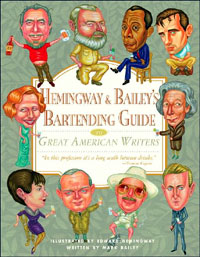|
I'm writing this column at my desk—drinking coffee, rather than at a bar imbibing booze. I haven't howled at the moon, danced on or fallen under the table, or been in a drunken brawl. My only hangover is a caffeine buzz. What a wasted life I'm living! I'm an olive plucked from the martini glass of great American arts and letters.
"Hemingway & Bailey's Bartending Guide to Great American Writers," (Algonquin Books of Chapel Hill) is a Valentine to the days when the god Bacchus was as essential to creativity as any Muse.  Or perhaps, the Muse herself. The 100-page book is illustrated by Edward Hemingway, an artist, illustrator and grandson of Papa, and written by Emmy-nominated author Mark Bailey. This slim volume is one of a number of recent books that combine recipes with literary anecdotes. (Bailey is not related to the Bailey's of Bailey's Irish Creme.) Or perhaps, the Muse herself. The 100-page book is illustrated by Edward Hemingway, an artist, illustrator and grandson of Papa, and written by Emmy-nominated author Mark Bailey. This slim volume is one of a number of recent books that combine recipes with literary anecdotes. (Bailey is not related to the Bailey's of Bailey's Irish Creme.)
Some of these works are too much like saccharine greeting cards—of the sappiest things any authors have ever said combined with faux Victorian illustrations variety. Others are way too gimmicky–with answers to questions like "what would a dog who was God have said, if He'd eaten Proust's Madeleine?" "Bailey's Bartending Guide" will never be confused with "War and Peace." I read most of it while riding the subway for half an hour in Washington, D.C.
Much of the book consists of quotes about booze ("I drink exactly as much as I want and one drink more," said H. L. Mencken) and recipes of famous writers' fave drinks (from James Baldwin's Shandy Gaff to Dorothy Parker's Champagne cocktail). In our time, where recovery from alcoholism is (the non-alcoholic) Toast of the Town and the three-martini lunch is as outdated as the VCR, Hemingway and Bailey may seem (to some) to glorify boozing. Yet, to me, "Hemingway and Bailey's Bartending Guide to Great American Writers," without glossing over the serious problem of alcoholism, makes some fabulous authors and their haunts (from Parisian nightclubs to the Algonquin Hotel) come alive.
My only memory of "Babbitt" by Sinclair Lewis is that I hated having to read it in high school. I thought Lewis was a boring guy, who wrote books to torture teenagers in English classes. Now, I see I wasn't giving him a fair shake. Sure, Lewis "was known for hurling insults and mimicry and often, quite spontaneously passing out," Bailey writes. Yet, while this isn't admirable behavior, you gotta admire his taste in booze. Lewis's favorite drink was a Bellini (a delicious mix of Champagne and peach nectar). "What's the use of winning the Nobel Prize if it doesn't even get you into speakeasies?" Lewis asked during Prohibition.
"Hemingway & Bailey's Bartending Guide to Great American Writers," is in many ways a frothy concoction, full of wit and sloshed charm. I laughed when I read humorist and critic Robert Benchley's quip, "Drinking makes such fools of people, and people are such fools to begin with, that it's compounding a felony." At four o'clock in the morning, "when everybody's drunk enough, then extraordinary things can happen," Baldwin said. This makes me want to round up my buddies in the middle of the night so we can swim in a bathtub of gin and, then, write a fantastic postmodern masterpiece.
Yet, as Bailey and Hemingway, make all too clear (without becoming preachy), sadness and damaged lives can be offshoots of drinking and creative artists. It's heartbreaking when poet Anne Sexton says, "I have a martini and I feel, once more, real." I wish Carson McCullers hadn't needed to drink a tea and sherry concoction (which Bailey says she called her "sonnie boy") in order to write. It's wrenching to learn that Tennessee Williams, drunk on the road, would, not knowing where he was, tell people on the phone that he was "at the Sheraton."
Wouldn't it be great if drinking had no destructive side? Still, "life is as much a merry tavern as a sad hotel," as Williams once said. "Bailey's Bartending Guide," invites us to spend time at both venues with poets and writers. I'll drink to that!
|
